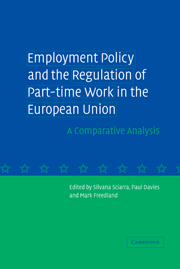Book contents
- Frontmatter
- Contents
- List of figures and tables
- Notes on contributors
- Preface
- List of abbreviations
- PART I
- 1 New discourses in labour law: part-time work and the paradigm of flexibility
- 2 The European Employment Strategy and the regulation of part-time work
- 3 The role of EU employment law and policy in the de-marginalisation of part-time work: a study in the interaction between EU regulation and Member State regulation
- PART II
- Index
3 - The role of EU employment law and policy in the de-marginalisation of part-time work: a study in the interaction between EU regulation and Member State regulation
Published online by Cambridge University Press: 30 July 2009
- Frontmatter
- Contents
- List of figures and tables
- Notes on contributors
- Preface
- List of abbreviations
- PART I
- 1 New discourses in labour law: part-time work and the paradigm of flexibility
- 2 The European Employment Strategy and the regulation of part-time work
- 3 The role of EU employment law and policy in the de-marginalisation of part-time work: a study in the interaction between EU regulation and Member State regulation
- PART II
- Index
Summary
Introduction
In this chapter, we advance some suggestions towards a general assessment of the significance which EU law and policy have had and are having in the regulation of part-time work in the Member States whose experience is recounted and analysed in other chapters of this work. Our starting point is that, in those Members States, there has occurred, since the early 1980s, a process which we can identify as the de-marginalisation of part-time work. That is to say, part-time work has moved from the outer edges of employment policy and practice towards the central area of the labour market. Our inquiry is to understand what impact EU regulation has had and is having on that process.
We concentrate on EU measures or interventions specifically directed to part-time work, particularly the Part-time Work Directive of 1997, but also the part-time work element in the EU Employment Guidelines. However, those measures or interventions have to be seen in the context of a larger set of measures and interventions which bear upon or regulate part-time work, at both national and supranational levels. For example, specific measures or interventions cannot be seen in isolation from more general ones designed to stimulate employment and combat social exclusion, to regulate basic labour standards, or to control gender discrimination in employment. Nevertheless it is useful to single out measures and interventions which are specific to part-time work for a case-study of interaction between EU regulation and member state regulation.
- Type
- Chapter
- Information
- Employment Policy and the Regulation of Part-time Work in the European UnionA Comparative Analysis, pp. 63 - 82Publisher: Cambridge University PressPrint publication year: 2004
- 4
- Cited by



